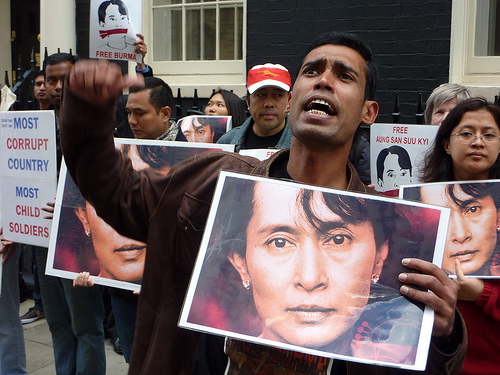Irrespective of the wave of criticism the electoral laws attracted from pro-democracy forces and foreign governments, it seems clear that the multi-party election will take place with or without the participation of non-junta supported parties. This includes the main democratic opposition, the Suu Kyi-led National League for Democracy (NLD), providing a serious challenge to the NLD and other political stakeholders.
Regardless of the mockery that the 2010 Myanmar elections may make of the democratic process, it would be an even bigger blow for the country if no genuine opposition participates. Under the new laws, NLD will face dissolution as a legal entity if it continues with its current plan to boycott the election.
Despite the undemocratic clauses of the 2008 Constitution on which the 2010 election is based, it will essentially allow a pseudo-civilian government to be formed after the election. This will include the re-introduction of a parliamentary system in Myanmar, albeit with 25 per cent of the seats guaranteed for the military. Despite the unfair practices and challenges any opposition may face the election also provides an opportunity for opposition groups to challenge the SPDC, by competing for seats against junta-backed proxy parties.
Hundreds of genuine democratic enthusiasts not affiliated with the NLD will still be keen to compete in the elections. Some may succeed in the polls even in the face of open intimidation and junta manipulation.
By participating in the election, even without Aung Sang Suu Kyi’s approval or the NLD’s involvement, opposition groups may garner enough support to become viable players in the Burmese political landscape. Additionally, from within the SPDC-ascribed framework, opposition politicians will finally have a ‘legitimate’ platform to push for gradual political liberalization, and perhaps even more importantly, address key pragmatic social and economic concerns of the state when the parliament finally convenes after a hiatus of several decades.
For the last two decades, the NLD and the international community have continued to condemn and dismiss the SPDC. However, continued isolation, Western sanctions and moral condemnation of the generals have done little to sway the junta’s position. Such policies have in fact only strengthened the junta’s resolve to develop the Burmese state at their own pace and on their own terms.
Irrespective of what Aung Sang Suu Kyi stands for, and the noble sacrifices she and others have made in their demand for a democratic Myanmar, the reality is that Western support and continued focus on Suu Kyi and the NLD, along with their sanctions, have failed to influence the ruling junta.
Participating in the election within the constraints set by the junta may seem like kowtowing to the military regime and falls far short of the international norms in upholding a credible democratic process. However, for a nation that has been plagued by civil war, ethnic tensions, factional politics, and bureaucratic inefficiency ever since its independence, participation in the election is perhaps the only viable option at present for any constructive development.
Aung Sang Suu Kyi will remain an important figure for the future of Myanmar, whether as a living martyr or as a figure for peace and reconciliation in a more politically-relaxed Myanmar. However, the political realities of today’s Myanmar suggest that pragmatism must prevail over abstract notions of democracy and simplistic moral positions. For the betterment of the Burmese populace, gradual, incremental political changes will be more constructive than continued absolutist positions which insist on vague and unrealistic goals aimed at direct and immediate ‘democracy’ in the Myanmar state.
As the former Burmese UN Secretary-General U Thant reportedly once said, ‘Governments, systems, ideologies come and go, but it is humanity which remains.’ Similarly, in order for Myanmar to move beyond its current political impasse, strict dogmatism must be abandoned by the NLD and other oppositional stakeholders. As long as the democratic forces survive the 2010 electoral games, hope will remain for Myanmar.
Roger Huang is Research Development Officer at the Centre for Asian Pacific Studies, Lingnan University, Hong Kong.
This article was as an entry in the recent EAF Emerging Scholars competition.


Hear hear. Having lived in Myanmar, and recently returned to revisit and reconnect, I reached the same conclusions – and heard them expressed from a number of local sources. Whatever happens, this is going to be a difficult year for the country as the Thingyan bombing demonstrated.
This is a great article, articulately and intelligently providing readers with some idea of the complexity of the political context there. (I didn’t know about the reserved military seats)
Would be interested in further research concerning the junta and non-junta-supported opposition parties, and their viability. My impressions were that the NLD is the only non-junta party that unifies the ethnically diverse country… which means that there is limited opportunity for any other party to capture enough support to shift power effectively.
Most articles on Burma I had come across in the last few decades either condemn the SPDC or praise Aung San Suu Kyi, with the ultimate aim to bring good governance and fully-fledged democracy to the country. While the intentions were good, to some extent, they have had some unintended impact such as the profound mistrust between the SPDC, and Aung San Suu Kyi and the international community, and the subsequent political impasse.
Similarly, when the SPDC annouced that the parliamentary election of Burma will be held in 2010, almost all the articles criticised the flawed constitution and electoral laws, and their systematic exclusion of Aung San Suu Kyi, other prominent politicians and their parties. It’s good to see this particular and unusual article suggesting the process, i.e. the election itself, and participation, though not ideal, might be the pragmatic alternative in making a step closer to the goal. And I cannot agree more.